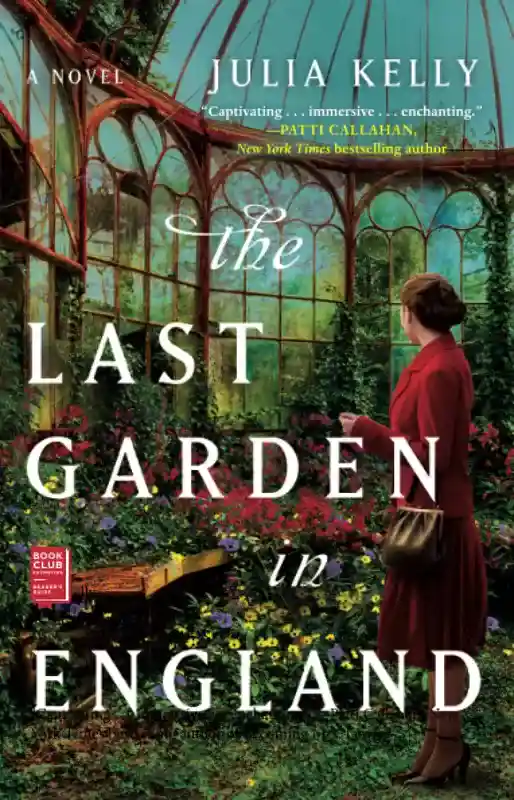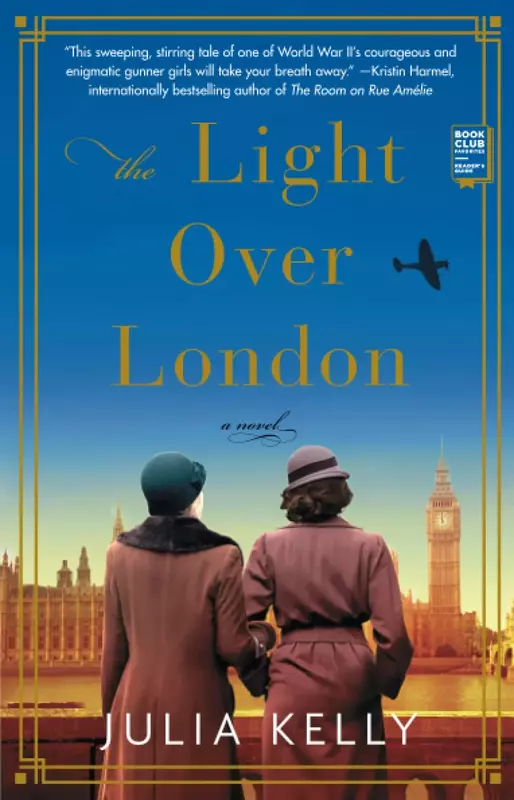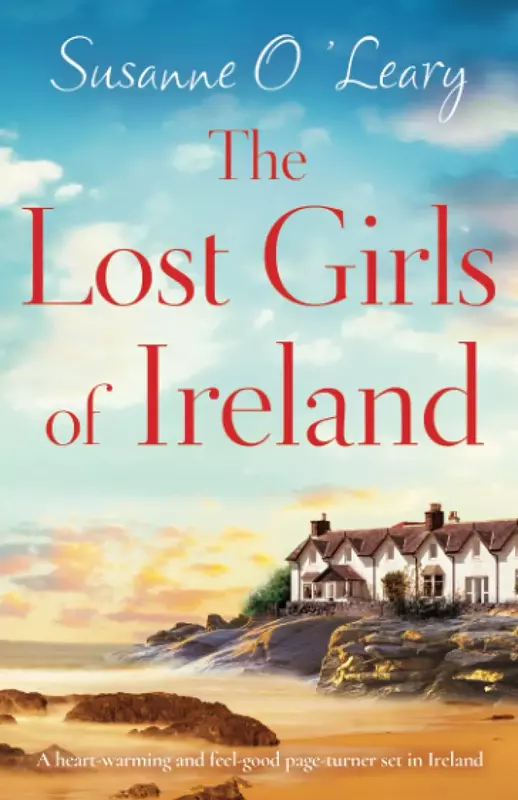This post may contain affiliate links. Read more here.
Book club questions for The Lost English Girl by Julia Kelly explore the themes of family, sacrifice, and forgiveness in the face of adversity.
How do Viv and Joshua’s differing backgrounds and aspirations affect their choices and their relationships with each other and their families? How do the experiences of evacuation and war shape the characters’ perspectives and actions? What role does music play in the story, both as a means of escape and as a way of connecting people across social and cultural divides?
The Lost English Girl by Julia Kelly is a historical fiction novel that follows Viv Byrne, a young woman in 1935 Liverpool who finds herself pregnant after a fling with a Jewish man named Joshua Levinson. To escape her strict Catholic family’s scrutiny, Viv marries Joshua and gives birth to a daughter named Maggie.
However, Joshua soon makes a life-changing decision on their wedding day, leaving Viv to return to her disapproving family. Five years later, on the eve of World War II, Viv is forced to evacuate Maggie to the countryside estate of the wealthy Thompson family. Meanwhile, Joshua enlists in the Royal Air Force and heads off to fight for his country.
As a book club selection, The Lost English Girl offers rich material for discussion, including topics such as family dynamics, societal norms and expectations, the impact of war on families and individuals, the struggles of single parenthood, and the power of forgiveness. The novel’s historical setting also offers an opportunity to explore the experiences of World War II evacuees and the broader impact of war on civilian populations.
The Lost English Girl explores themes of family, sacrifice, and forgiveness in the face of war and tragedy. It raises questions about the lengths we go to protect our loved ones, the consequences of our actions, and the power of forgiveness in rebuilding relationships.
We hope you will enjoy discussing my book club discussion questions for The Lost English Girl! Have fun analyzing the themes of the story with your book clubs, and let us know your thoughts! ✨
The Synopsis
Liverpool, 1935: Raised in a strict Catholic family, Viv Byrne knows what’s expected of her: marry a Catholic man from her working-class neighborhood and have his children. However, when she finds herself pregnant after a fling with Joshua Levinson, a Jewish man with dreams of becoming a famous Jazz musician, Viv knows that a swift wedding is the only answer. Her only solace is that marrying Joshua will mean escaping her strict mother’s scrutiny. But when Joshua makes a life-changing choice on their wedding day, Viv is forced once again into the arms of her disapproving family.
Five years later and on the eve of World War II, Viv is faced with the impossible choice to evacuate her young daughter, Maggie, to the countryside estate of the affluent Thompson family. In New York City, Joshua gives up his failing musical career to serve in the Royal Air Force, fight for his country, and try to piece together his feelings about the family, wife, and daughter he left behind at nineteen. However, tragedy strikes when Viv learns that the countryside safe haven she sent her daughter to wasn’t immune from the horrors of war. It is only years later, with Joshua’s help, that Viv learns the secrets of their shared past and what it will take to put a family back together again.
Telling the harrowing story of England’s many evacuated children, bestselling author Julia Kelly’s The Lost English Girl explores how one simple choice can change the course of a life, and what we are willing to forgive to find a way back to the ones we love and thought lost.
In love with literature? Try audio books or writing classes
for free for 30 days.✨
Selected Reviews for The Lost English Girl
“From the first pages, Kelly’s latest grabs readers’ attention with the character of courageous Viv Byrne as she strives to fight societal norms . . . fast-paced historical fiction with a hint of suspense.” –Booklist
“A fascinating novel about a woman’s struggle with an out-of-wedlock pregnancy, her parents’ harsh treatment of both mother and child, and the separation from her child under the threat of an imminent war.” –Library Journal
“Well-paced, highly emotional… an excellent read with a satisfying ending.” –Historical Novels Review
Book Club Questions for The Lost English Girl
The following book club questions have been tailored to this book’s specific reading experience.✨
1. The concept of legitimacy is central to Viv’s predicament, but what does this mean for her child’s future? How might the child’s life have differed if he or she was born out of wedlock? How did societal expectations influence Viv’s options and decision-making process? Are there parallels to this kind of societal pressure in today’s world?
2. How might the story have been different if set in a different historical period, such as Nazi-occupied Europe during World War II? What cultural and societal norms would be different, and how might Viv and Joshua’s experiences change?
3. Discuss Joshua’s motivations for accepting Viv’s parents’ money and leaving her and their child behind. Was his decision justified, or did he break his promise and leave them vulnerable? How does this decision reflect on his character, and does it change your opinion of him?
4. If you were in Joshua’s shoes, would you have made the same decision to pursue your dreams at the cost of abandoning your family? Is it possible to justify prioritizing one’s own desires over familial obligations?
5. The book presents Joshua’s internal dialogue as he rationalizes his actions, but what might the other characters be thinking in the same situation? How might their perspectives differ, and what would their reactions be to Joshua’s decision?
6. Analyze Joshua’s character arc throughout the book, from his initial promise to be a husband and father to his ultimate decision to return to Liverpool and prioritize his family over his music career. How does this evolution shape his character, and what motivates his transformation?
7. The book addresses the real-life government evacuation program during World War II, but what factors would you consider if faced with a similar decision? How would societal expectations and personal beliefs influence your decision, and what kind of sacrifices might you have to make?
8. The characters in the book make various sacrifices throughout the story, some due to the war and some due to their individual circumstances. How do these sacrifices affect their lives, and what do they reveal about their values and priorities? Are some sacrifices more noble or justified than others, and how does this reflect the societal norms of the time? How does Viv’s job as a postie during the war illustrate the sacrifices made by women during this time period?
9. In the beginning, I might have expected Maggie to be treated poorly and possibly face discrimination as an evacuee. However, I was surprised to see how well she was initially treated by the Thompsons. What surprised me the most was Maggie’s difficulty adjusting to her new life and the homesickness and longing she felt for her old life.
10. Viv and Maggie’s reunion is a complex and emotional moment in the story. It is understandable for Viv to be furious with the Thompsons for taking her daughter away without her consent. At the same time, it is also understandable for Maggie to be scared and unsure about leaving the people who have been her family for the past five years. It is fair to empathize with all the characters in this situation, including the Thompsons. They were trying to do what they thought was best for Maggie, even if it was not their decision to make.
11. There are several weak male characters in the story, such as Mr. Byrne, Mr. Thompson, and Joshua. Their weakness is evident in their actions or lack thereof. In comparison, Mrs. Byrne and Mrs. Thompson are strong women who take on the role of the head of their household. I feel a sense of admiration and respect for these women, who step up to take care of their families when their husbands fail to do so.
12. Father Monaghan’s character and actions are complicated. While he believed that he was doing the right thing by giving Maggie a “respectable Catholic home,” his actions ultimately caused more harm than good. By removing Maggie from the only family she had ever known, he caused her a great deal of pain and trauma. It is clear that Father Monaghan was more concerned with upholding societal norms than with the well-being of the child.
13. Moss’ response to Viv’s question about seeking Joshua’s forgiveness is an important moment in the book. It highlights the idea that forgiveness is not something that can be demanded or expected, but rather something that must be earned. This perspective may have influenced Viv’s resistance to forgiving Joshua, as she may have felt that he had not yet done enough to earn her forgiveness.
14. Forgiveness is a recurring theme in the book. It is a complex issue that raises many questions about when and how forgiveness should be given. In general, I believe that forgiveness should be given when the person seeking it has demonstrated genuine remorse and a willingness to make amends. However, there are situations where forgiveness may not be appropriate, such as when the person seeking forgiveness continues to harm others. People can change, but it takes time and effort, and forgiveness should not be given lightly.
15. How do Viv’s strict Catholic upbringing and her family’s expectations for her future influence her decision-making throughout the book? How does she reconcile her desires with the expectations of her family and society?
16. The Lost English Girl shows how one simple decision can change the course of a life. What decision did Viv make that changed the course of her life? How did that decision affect her and her family in the short and long term?
17. Julia Kelly weaves together multiple perspectives and timelines in The Lost English Girl. How does this technique enhance the reader’s understanding of the characters and their experiences? What are the benefits and challenges of using this technique in storytelling?
18. The Lost English Girl is set against the backdrop of World War II and the evacuation of children from cities to the countryside. How does this historical event impact Viv’s life and the lives of those around her? What does it reveal about the resilience of the human spirit?
19. Music plays a significant role in the book, particularly for Joshua. How does his love for music shape his character and his relationships with others, particularly Viv and Maggie? In what ways does music provide a lens through which to view the larger themes of the book?
20. What is the significance of the title, The Lost English Girl? Who or what does it refer to, and what does it reveal about the novel’s themes and characters?
Additional Recommendations
Hope you enjoyed my book club and discussion questions for The Lost English Girl by Julia Kelly!
Here are some more of my book club recommendations:
The Last Garden in England by Julia Kelly
Present day: Emma Lovett, who has dedicated her career to breathing new life into long-neglected gardens, has just been given the opportunity of a lifetime: to restore the gardens of the famed Highbury House estate, designed in 1907 by her hero Venetia Smith. But as Emma dives deeper into the gardens’ past, she begins to uncover secrets that have long lain hidden.
1907: A talented artist with a growing reputation for her work, Venetia Smith has carved out a niche for herself as a garden designer to industrialists, solicitors, and bankers looking to show off their wealth with sumptuous country houses. When she is hired to design the gardens of Highbury House, she is determined to make them a triumph, but the gardens—and the people she meets—promise to change her life forever.
1944: When land girl Beth Pedley arrives at a farm on the outskirts of the village of Highbury, all she wants is to find a place she can call home. Cook Stella Adderton, on the other hand, is desperate to leave Highbury House to pursue her own dreams. And widow Diana Symonds, the mistress of the grand house, is anxiously trying to cling to her pre-war life now that her home has been requisitioned and transformed into a convalescent hospital for wounded soldiers. But when war threatens Highbury House’s treasured gardens, these three very different women are drawn together by a secret that will last for decades.
“Gorgeously written and rooted in meticulous period detail, this novel is vibrant as it is stirring. Fans of historical fiction will fall in love with The Last Garden in England” (Roxanne Veletzos, author of The Girl They Left Behind).
The Light Over London by Julia Kelly
It’s easier for Cara Hargraves to bury herself in the past than to confront the present, which is why working for a gruff but brilliant antiques dealer is perfect. While clearing out an estate, she pries open an old tin that holds the relics of a lost relationship: an unfinished diary from World War II and a photo of a young woman in uniform. Captivated by the hauntingly beautiful diary, Cara begins her search for the author, never guessing that it might reveal her own family’s wartime secrets.
In 1941, nineteen-year-old Louise Keene feels trapped in her Cornish village, waiting for a wealthy suitor her mother has chosen for her to return from the war. But when Louise meets Flight Lieutenant Paul Bolton, a dashing RAF pilot stationed at a local base, everything changes. And changes again when Paul’s unit is deployed without warning.
Desperate for a larger life, Louise joins the women’s auxiliary branch of the British Army in the anti-aircraft gun unit as a gunner girl. As bombs fall on London, she and the other gunner girls show their bravery and resilience while performing their duties during deadly air raids. The only thing that gets Louise through those dark, bullet-filled nights is knowing that she and Paul will be together when the war is over. But when a bundle of her letters to him are returned unopened, she learns that wartime romance can have a much darker side.
“Sweeping, stirring, and heartrending in all the best ways, this tale of one of WWII’s courageous, colorful, and enigmatic Gunner Girls will take your breath away” (Kristin Harmel, bestselling author of The Room on Rue Amelie).
The Lost Girls of Ireland by Susanne O’Leary
A heart-warming story about family secrets and one woman’s escape to dreamy Sandy Cove on the stunning west coast of Ireland.
The picturesque beach of Wild Rose Bay is the last place Lydia Butler thought she’d be. But having just lost everything, the run-down cottage she inherited from her Great Aunt Nellie is the only place she can take her daughter, Sunny. Hidden away in a tiny Irish village, she can protect Sunny from the gossip in Dublin, and the real reason they have nowhere else to live…
The cottage is part of the old coastguard station and other eccentric residents are quick to introduce themselves when Lydia arrives. Lydia instantly feels less alone, fascinated by the stories they have about Nellie, and she’s charmed by American artist, Jason O’Callaghan, the mysterious man who lives next door.
But the longer Lydia relaxes under the moonlit sky, the more the secret she’s keeping from Sunny threatens to come out. And as she finds herself running into Jason’s arms, she knows she must be honest and face up to the past she has tried to forget. Has she finally found people who will truly accept her, or will the truth force her to leave the cottage for good?
Thank you for reading my book club discussion questions and as always, happy reading! ❤️


